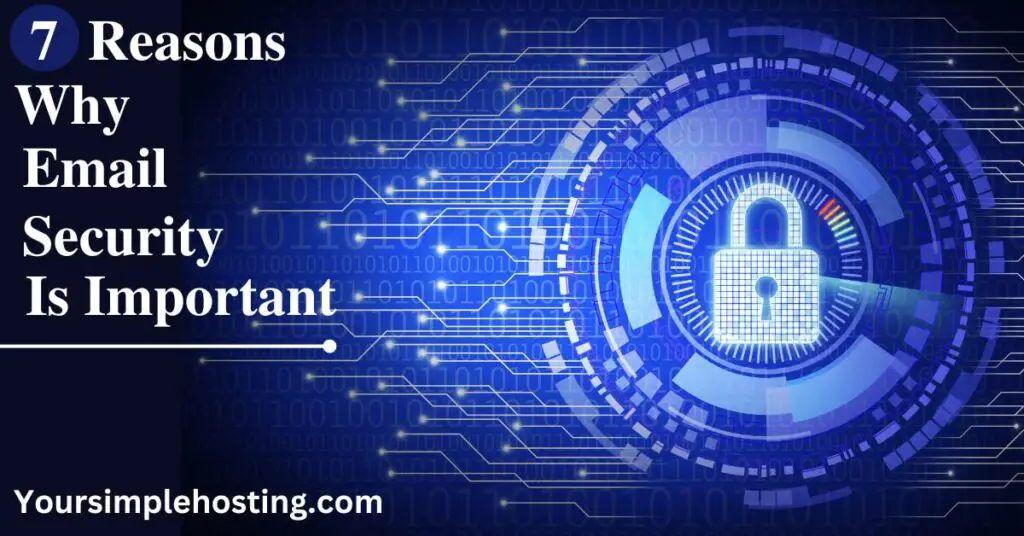Email has become an essential tool for communication and information exchange in personal and professional settings.
However, with the increasing reliance on email, it has also become a prime target for cybercriminals looking to grab sensitive data.
From phishing scams to malware attacks, the threat to email security is real and growing. Email security is crucial for protecting sensitive information, preventing data breaches, maintaining business continuity, and complying with regulations.
Therefore, individuals and organizations must take steps to protect themselves against these threats and ensure the security of their emails and data.
This article will explore the various types of email security risks and the best practices to safeguard against them, so let’s begin.

Table of Contents
What Is Email Security?
Email security protects communications and systems from unauthorized access, misuse, and disruption. It involves protecting the confidentiality and integrity of email data and procedures as well as ensuring email services’ availability.
This can include implementing technologies, policies, and procedures to prevent unauthorized access, detect and respond to security incidents, and ensure the privacy and authenticity of email communications.
Some standard email security measures include encryption, authentication, spam filters, malware filters, email archiving and backup, and regular software and security updates.
In an era where email has become a primary communication and information exchange, email security is essential to protect sensitive information and prevent costly data breaches.
Why Is Email Security Important: 7 Key Reasons
Email security is essential for several reasons, such as the following:
1. Protecting Confidential Information
Emails often contain sensitive information such as financial data, personal information, trade secrets, and other sensitive data. Email security measures help prevent unauthorized access to this information, ensuring it remains confidential and protected.
2. Preventing Data Breaches
Unsecured emails can be a gateway for hackers to access an organization’s data and systems. Email security helps prevent data breaches by making it more difficult for unauthorized users to access and steal sensitive data.
3. Preventing Phishing and Spoofing
Phishing is a cyber attack aimed at stealing sensitive data through phishing campaigns. Spoofing is when an attacker forges the sender’s address to make the email appear to come from a trustworthy source.
Email security measures help prevent phishing and spoofing attacks by filtering out suspicious emails and authenticating the sender of an email.
4. Protecting Against Malware
Malware, or malicious software, can be spread through email attachments or malicious links by cybercriminals. Email security measures, such as spam and malware filters, can help detect and block malware before it reaches a user’s inbox.
5. Complying With Regulations
Certain industries are subject to regulations that require the protection of sensitive information.
Email security measures can help organizations comply with laws such as the General Data Protection Regulation (GDPR) and the Health Insurance Portability and Accountability Act (HIPAA).
6. Enhancing Reputation
By securing email communications, organizations can enhance their reputation and demonstrate their commitment to protecting sensitive information.
7. Improving Productivity
Email security measures such as encryption can help improve productivity by reducing the risk of downtime and ensuring the availability of email services.
In short, the advantages of email security include protecting confidential information, preventing data breaches and malware attacks, enhancing reputation, compliance with regulations, and improving productivity.
Implementing effective email security measures can help organizations and individuals secure email communications and reduce the risk of costly security incidents.

9 Best Practices for Email Security
The best email security practices that can help protect yourself or your business include the following:
Email Encryption
Email encryption can protect sensitive information from cybercriminals and ensure the privacy of email communications.
Secure Email Gateway
Implementing email authentication methods such as SPF (Sender Policy Framework) and DKIM (Domain Keys Identified Mail) can help prevent email spoofing and phishing attacks.
Spam and Malware Filters
Installing spam and malware filters and following a simple mail transfer protocol can help prevent malicious emails from reaching a user’s inbox and reduce the risk of malware attacks.
Regular Software and Security Updates
Updating email software and security measures can help protect against new threats and vulnerabilities.
Email Archiving and Backup
Regularly backing up email data and archives can help ensure the availability of email services and prevent data loss in case of a security incident.
Strong Passwords
Using strong and unique passwords can help prevent unauthorized access to email accounts.
User Awareness and Education
Educating users on safe email practices, such as avoiding suspicious links and attachments, can help reduce the risk of security incidents.
Incident Response Plan
Having a plan to respond to security incidents can help minimize the impact of a security breach and ensure a timely and effective response.
Regular Security Audits
Regularly auditing email systems and processes can help identify potential security weaknesses and ensure that email security measures are up-to-date and effective.
To summarise, the best email security practices include encryption, authentication, spam and malware filters, regular software and security updates, email archiving and backup, strong passwords for email accounts, user awareness and education, incident response planning, and periodic security audits.
Implementing these practices can help organizations and individuals secure their email communications and reduce the risk of security incidents.
Dangers of Poor Email Security
Lack of email security can result in negative consequences for individuals and organizations. Some of the harm that can result from poor email security include:
Phishing Attacks
Hackers can easily intercept unsecured emails using the information obtained to launch these attacks.
Phishing attacks can result in the theft of sensitive information, such as login credentials, financial information, and sensitive data.
Spread of Malware
Malicious software, such as viruses and ransomware, can be spread through unsecured emails, resulting in infected computers and networks, which can cause damage and disrupt operations.
Data Breaches
Unsecured emails can leave organizations vulnerable to data breaches.
Information transmitted through unsecured emails, such as financial data, personal information, and trade secrets, can be intercepted and used for unauthorized purposes by cybercriminals.
Loss of Productivity
A lack of email security can significantly disrupt business operations and employee productivity. In addition, employees may have to spend time dealing with the aftermath of security incidents, such as cleaning up infected computers and restoring data.
Damage to Reputation
A breach of email security can significantly damage an organization’s reputation, leading to customer and stakeholder loss of business and trust.
Overall, a lack of email security can have serious and far-reaching consequences for individuals and organizations. So, it’s important to implement strong cyber security measures, such as encryption, authentication, and anti-malware protection.
Conclusion
Email security is a critical aspect of modern communication that helps protect sensitive information and ensure the privacy of email communications.
The best email security practices include encryption, authentication, spam and malware filters, regular software and security updates, email archiving and backup, strong passwords, user awareness and education, incident response planning, and periodic security audits.
It is important for every business, as it helps protect confidential information, prevent data breaches, ensure compliance with regulations, improve productivity, and enhance reputation.

Leave a Reply